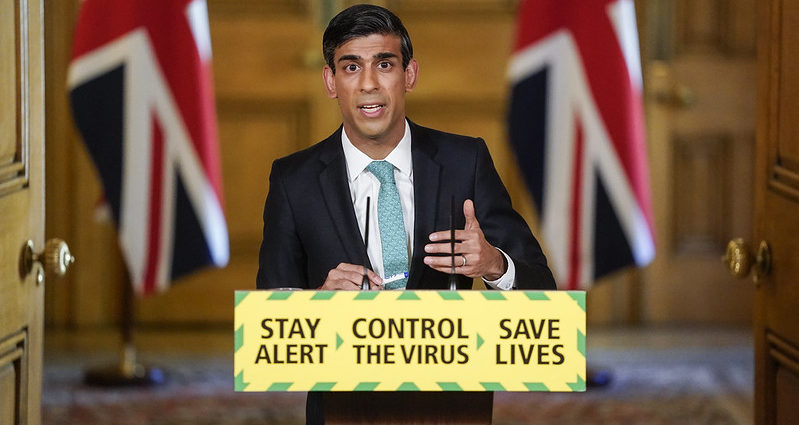The Chancellor Rishi Sunak unveiled a new sweeping economic recovery plan today with the aim of rooting out consumer anxiety over spending and providing longer term support for the increasing number of unemployed people across the UK.
The new measures which total up to £30bn are intended to help protect further job losses and lessen the effects of the forseable economic crash as the government places more of its attention onto reviving the hospitality industry. Included in the Chancellor’s statement was a pledge to cut stamp duty (£4bn), introduce a kickstart scheme to subside jobs for the young (£2bn) and significantly cut VAT for hospitality businesses (£4bn).
One of Sunak’s main concerns leading to this announcment has been the continuing lack of public confidence to reinvesting in a deteriating retail landscape as people value their safety far above repairing the scars of the economy. In the latest Gfk figures for consumer confidence, there has only been a 3 point increase between June and July meaning that economic confidence still lies way below the average at -27.
By introducing his “eat out to help out” scheme, which will mean diners will get 50% off their restaurant bill at many eateries throughout August, Sunak hopes that more people will be encouraged to take the risk to eat out in order to get the economy back on it’s feet. This comes at a time where the situation has been pinned as a “unique moment” which requires ultimate creativity by the chancellor.
Sunak, who praised his existing economic response to the Covid-19 crisis as one of the “largest and most comprehensive” economic responses in the world, went further to state that “the job has only just begun” in terms of fiscal intervention. “I want every person in this house and in the country to know that I will never accept unemployment as an unavoidable outcome”, Sunak said into today’s announcement in the commons.
Rishi Sunak says while the government has taken “decisive action to protect our economy” he acknowledges people are “anxious” about unemployment.
He adds: “People need to know that although hardship lies ahead, no one will be left without hope.”
Live: https://t.co/U7KKaH3X3W pic.twitter.com/wJO2RvviZf
— Sky News (@SkyNews) July 8, 2020
“many are, however, starting to doubt if such economic intervention is fiscally responsible or if it is in fact worsening the situation to come.”
More detail is expected to follow in the coming days about the substance of many of these economic reforms, indicating today’s announcement may only be a hint of much larger reform, but the overall rhetoric of the government gives of the impression of a shifting liberalisation of its politics in the face of economic disaster – suggesting that they have a similar approach to spending as that of past Labour governments.
With UK debt now larger than the size of the whole economy and government spending almost at record highs, many are, however, starting to doubt if such economic intervention is fiscally responsible or if it is in fact worsening the situation to come. As critics have argued in the past, the Conservative party’s launching of a magic money tree in order to fund the UK’s financial woes is frustrating to lots of the general public as it such spending seems largely unsustainable and is only targeted a certain areas of society leaving other sectors to fall by the wayside. ‘It is quite astounding that out of all the hundreds of billions of pounds @rishisunak has allocated, the ONLY thing I benefit from is a half price Nandos in August’, one critic pointed out on Twitter as they showed frustration over the lack of supporters for freelancers during this time.
“Whilst opinions are divided on if Sunak’s response was appropriate in the current situation, most can’t deny that his sentiment seemed to be in the right place.”
Others have been far more optimistic over Sunak’s plan as they see it as a much needed lifeline for many failing sectors. The Chancellor’s support amongst the general public has remained at a consistent high throughout the pandemic with a new Deltapoll survey from the 5th July giving him a 41% support rate, demonstrating that he is a clear backbone of support for his policies. His support has been so high in recent weeks that many are starting to see a popularity distinction being Johnson and the Chancellor as some believe this puts him in a good position to be the next PM. UK hospitality, the trade body which acts a representative for the industry, also “warmly” welcomes Sunak’s policy move and they also praise the decision to create thousands of job placements for young people.
Whilst opinions are divided on if Sunak’s response was appropriate in the current situation, most can’t deny that his sentiment seemed to be in the right place and even the opposition benches struggled to critique the government’s policy when so much funds were being launched at revitalising the economy.
As the Spectator’s Editor, Fraser Nelson, points out, the way the Chancellor is perceived in the coming months will depend a lot on future actions as all focus turns to the upcoming autumn budget. Whilst Rishi Sunak’s sweeping economic pledges seem beneficial at the moment, will consumers now have the confidence to implement this economic shift and will the Chancellor be able to balance the books after spending at an unprecedented scale? The UK could be braced for high tax rises to come but all this will depend on what move the Chancellor decides to carry out next.
Lauren McGaun
Featured image courtesy of Number 10 on Flickr. Image license found here. No changes were made to this image.

